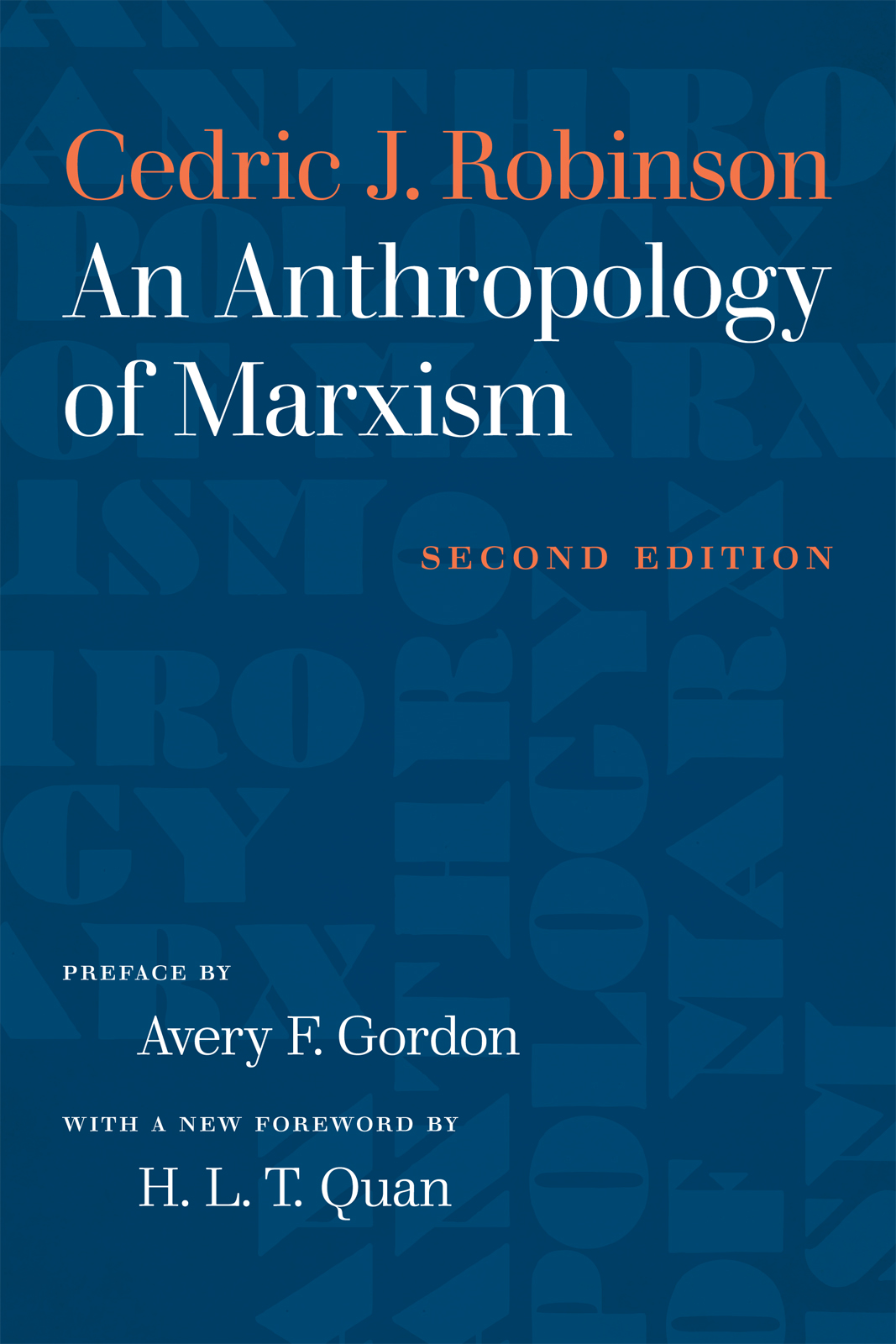AN ANTHROPOLOGY OF MARXISM
Cedric J. Robinson
Second Edition
With a new foreword by H. L. T. Quan
Preface by Avery F. Gordon
The University of North Carolina Press Chapel Hill
2001 Cedric J. Robinson
Foreword 2019 The University of North Carolina Press
Preface 2019 Avery F. Gordon
All rights reserved
Manufactured in the United States of America
Originally published by the Ashgate Publishing Company in 2001.
The University of North Carolina Press edition published in 2019.
Designed and set in Swift Neue LT and Futura by Rebecca Evans
The University of North Carolina Press has been a member of the Green Press Initiative since 2003.
Library of Congress Cataloging-in-Publication Data
Names: Robinson, Cedric J., author.
Title: An anthropology of Marxism / Cedric J. Robinson ; foreword by H. L. T. Quan ; preface by Avery F. Gordon.
Description: Second edition. | Chapel Hill : The University of North Carolina Press, [2019] | Includes bibliographical references and index.
Identifiers: LCCN 2018036573 | ISBN 9781469649900 (cloth : alk. paper) | ISBN 9781469649917 (pbk : alk. paper) | ISBN 9781469649924 (ebook)
Subjects: LCSH: Communism. | Socialism. | Materialism.
Classification: LCC HX73 .R6 2019 | DDC 335.4dc23 LC record available at https://lccn.loc.gov/2018036573
CONTENTS
FOREWORD
It is no small matter that Cedric J. Robinsons An Anthropology of Marxism, first published in 2001, is back in circulation. It is particularly poignant that his passing in June 2016 went virtually unnoticed in the media, despite the fact that todays insurgent black movements against state violence and mass incarceration call for an end to racial capitalism and see their work as part of a black radical traditionterms associated with Robinsons work. Moreover, the marginalization and trivialization of actual historical experience in theory building reflect a general hostility to so-called distractions from pure theory, with grave consequences, not least of which is the vulgar reductionism that ludicrously celebrates bourgeois achievements, all the while privileging the industrial working class over all others (as if such a discrete phenomenon could ever exist).
In its earliest incarnation, Anthropology served as a course reader for a political theory graduate seminar at the University of California, Santa Barbara, where Robinson taught for more than three decades. For Robinson, one could say that the writings have always been on the wall because the privileging of the Marxian discourse necessarily engenders a disconnect between the potentialities of actual socialist struggles that are people-led and the decays of elitist vanguardism, as exemplified by the implosion of the many state-managed economies that were occurring during this time.
While Robinsons contributions to reforming our understanding of Marxism and Marxs writings are many and invaluable, And so, Anthropology suggests that the antidote to this misapprehension is the coming to terms with the fact that since it can be demonstrated that Marxian socialism was not the first expression of socialism, it is probable that it will not be the last (17). This digging up and fleshing out of the popular germination of socialist discourse (19) are also the balm that make it possible to hope, and even yearn, for a socialist future.
The weight and promise of Anthropology are thus even more considerable when placed within the context of the current unjust world ordera world where inequality is manufactured, where wars are waged in the interest of corporations, where hundreds of thousands of farmers solution to debt is suicide, where entire communities are warehoused behind prison walls, where more than 3 billion people live on less than $2.50 a day, where the richest 1 percent owns more than everyone else, and where ghosts could be everywhere.
Indeed, as one of the worlds most high-profile social activists and a ferocious critic of twenty-first-century capitalism, Naomi Klein was recruited to help spread the word about the popes message on the environment and justice. Thus, and in this era of neoliberalism run amok, that Pope Francis, the most celebrated critic of unfettered capitalism, appears as one of the most formidable interlocutors of these times is not odd in and of itself. What may be odd is the fact that it has taken secular analysts, even ones as astute as Fisk and Klein, such a terribly long time to be open to the idea that some of the most potent critics of property and wealth have always been those who are governed by something other than the logic of accumulation and secularist instrumentalism. As Robinson demonstrated, the resistance to mysticism and religious inspirations is itself a symptom of the bourgeois science fantasy of total mastery of all things human, and, as Anthropology tells us, the Church and its ecclesial order, even as early as the twelfth century, had already contended with and partially conceded to the demands and passions of many a heretic, whose visions compelled them to rebel for a better world.
Robinsons magnificent analytics notwithstanding, it is his unyielding faithin the rightness of our collective moral authority when we contest malice and tyrannythat extends aid and comfort in times of injustice and unfreedom. As verifications of the socialist impulse and as an irrepressible response to social injustice, Anthropology excavates the archives of popular antiproperty sentiments and collective struggles against the Church and the ecclesial orders, along with secular authorities not unlike our own. Even if, as Robinson cautioned, we could never fully understand or come to terms with this human spirit (76), Anthropology suggests that it is imperative that we yearn and seek out alternative terrains to those delineated by the terms of capital and the state, precisely because Western socialism had older and different roots than those that have come to distract and disable our sensibilities away from expressions as diverse as the politically secular, the mystical, and the heretical (123). These alternative sites, as manifested in mass movements of violent rebelliousness, in hysterical devotion as well as ecclesiastical debates (123), contain visions of an alternative social orderthe very terrains that bourgeois historiography ignores and delimits. These visions, as Robinson argued, are not emblems of class hegemony, as Marx would have us believe, but the dialectic between power and resistance to its abuses (123). Such terrains are indeed fertile grounds for the retooling of what Arundhati Roy calls a new imagination and the right to dream into a system that tried to turn everyone into zombies.
H. L. T. Quan
PREFACE
This preface introduced the publication of An Anthropology of Marxism by Ashgate in 2001. It was written because when I suggested to Cedric that the book, whose manuscript I had read, might benefit from an introduction, he told me to write it. It was both a challenge and an honor to do so. The books reissue after languishing for so long unaffordable and unavailable is very welcome. The preface remains mainly as it was when first published with some minor revisions and editing.
They came to Thessalonica and Paul reasoned with them out of the Scriptures. And some of them believed and of the chief women not a few. But the Jews which believed not, moved with envy, took unto them certain lewd fellows of the baser sort, and gathered a company, and set all the city on an uproar crying. These that have turned the world upside down are come hither also.












